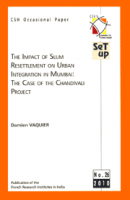Trisha LALCHANDANI

BIOGRAPHY:
Trisha Lalchandani is a doctoral researcher affiliated with CEIAS at École des Hautes Etudes en Sciences Sociales (EHESS), Paris, who works on the intricacies of class relationships through the (ostentatiously polylithic) religious practices of the Hindu Sindhis in twentieth-century India and patterns of urban settlement to unpack the potential linkages of these relationships with right-wing Hindu political rhetoric.
She examines the mobilization of the Sindhi deity Jhulelal in post-partition India as a diasporic community’s response to nation-making by seeking recourse to the majoritarian discourse of Hinduism. Her research relies on ethnographic fieldwork in Delhi and Mumbai, wherein the object of inquiry is space: Sindhis’ places of worship, neighborhoods, and marketplaces—and how they have assisted the emergence of Sindhis who proclaim a Hindu origin story. This narrative is built through the figure of the Vanyo (baniya), the local trader, who is perceived to be insignificant among other social groups of the Sindhis, such as the Amils or the Bhaibands, yet is made prominent through Jhulelal worship.
Selected publications:
- Lalchandani Trisha (in process) “The Purloined Deity: Jhulelal Devotion among the Vanyo”, Journal of Sindhi Studies (Brill), vol 2, issue 2.
- Lalchandani Trisha and Michel Boivin (in process) “Everyday Religiosity among the Hindu Sindhis of India: Negotiating the Religious Market in the Digital Era”, Studies in Region and Everyday Life, Ed. Farhana Ibrahim, Oxford University Press, Delhi.
- Lalchandani Trisha (2021), “Seeking Identity through Written Sources,” in Sindhi Tapestry: An Anthology of Reflections on the Sindhi Identity, Ed. Saaz Aggarwal, Black and White Fountain, Pune.
- Lalchandani Trisha (2016) “Alienation, Displacement, and Home in Mohan Kalpana’s Jalavatni,” in South Asia: Journal of South Asian Studies (Taylor and Francis), special issue on “Partition and Sindh: Dispersals, Memories and Diasporas,” Ed. Priya Kumar and Rita Kothari, vol. 39, no. 4.









